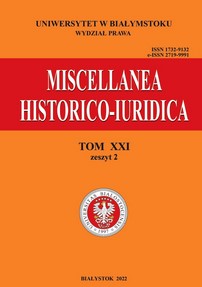Czy twórczość Jana Kochanowskiego może być źródłem poznania prawa?
Can Kochanowski’s Work Be a Source of Learning About the Law?
Author(s): Dariusz MakiłłaSubject(s): History of Law, 16th Century
Published by: Wydawnictwo Uniwersytetu w Białymstoku
Keywords: Polish Sejm of the 16th century; Jan Kochanowski; Greek envoys; sources of knowledge of law;
Summary/Abstract: The cognitive function of literary works is usually directly related to the social, historical or cultural context, reflecting, by means of literary fiction, the knowledge of what actually happened, or what could happen, being an expression of the projection of reality in the literary work. In this sense, it is possible for the creator of a literary work to relate to the actual reality in which he operated, legal and systemic relations, if their presentation in the presented work is important for the literary fiction that creates the work. Therefore, if we assume that a literary projection, even a fictional one, presents a sequence of events, and at the same time is embedded in a specific context, appropriate for the time of the work’s creation, in this case also covering legal and systemic relations relevant to the epoch, a literary work may thus fulfill a cognitive function. in the field of learning about the history of law or the political system. Based on these assumptions, the tragedy of Jan Kochanowski, The Greek Envoys, presented in 1578 in the presence of the royal couple during the wedding ceremonies of the then Crown Deputy Chancellor, Jan Zamoyski with Krystyna Radziwiłł, was examined. The current view that the work of J. Kochanowski reflected in the sphere of its literary fiction the course of the sessions of the former Polish Sejm from the second half of the 16th century, which its creator used to present political and ideological issues of that era, was verified in relation to the concept of the sources of learning about law.
Journal: Miscellanea Historico-Iuridica
- Issue Year: 21/2022
- Issue No: 2
- Page Range: 63-75
- Page Count: 13
- Language: Polish

